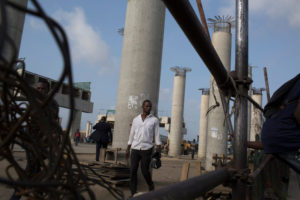WASHINGTON — President-elect Donald J. Trump’s views of Africa have, until now, been a mystery. But a series of questions from the Trump transition team to the State Department indicate an overall skepticism about the value of foreign aid, and even about American security interests, on the world’s second-largest continent.
A four-page list of Africa-related questions from the transition staff has been making the rounds at the State Department and Pentagon, alarming longtime Africa specialists who say the framing and the tone of the questions suggest an American retreat from development and humanitarian goals, while at the same time trying to push forward business opportunities across the continent.
“How does U.S. business compete with other nations in Africa? Are we losing out to the Chinese?” asks one of the first questions in the unclassified document provided to The New York Times.

That is quickly followed with queries about humanitarian assistance money. “With so much corruption in Africa, how much of our funding is stolen? Why should we spend these funds on Africa when we are suffering here in the U.S.?”
Some of the questions are those that should be asked by a new administration seeking to come to grips with the hows and whys behind longstanding American national security and foreign assistance policies. But it is difficult to know whether the probing, critical tone of other questions indicates that significant policy changes should be expected.
“We’ve been fighting al-Shabaab for a decade, why haven’t we won?” poses one question, referring to the terrorist group based in Somalia that was behind the Westgate mall attacks in Kenya in 2013.
Although the document represents a first look at how the new administration might approach policy toward Africa, a subject that was rarely touched on during the campaign, officials with the Trump transition team did not respond to queries about the list.
“Many of the questions that they are asking are the right questions that any incoming administration should ask,” said Monde Muyangwa, the director of the Africa program at the Woodrow Wilson Institute.
But she also noted that “the framing of some of their questions suggests a narrower definition of U.S. interests in Africa, and a more transactional and short-term approach to policy and engagement with African countries.”
Ms. Muyangwa said the queries could signal “a dramatic turn in how the United States will engage with the continent.”
J. Peter Pham, who has been mentioned for the job of assistant secretary of state for African affairs in a Trump administration, said he does not expect Mr. Trump to do a complete U-turn in relations with Africa.
Mr. Pham, director of the Africa program at the Atlantic Council, said he expects Mr. Trump will emphasize fighting extremism on the continent, while also looking to enhance opportunities for American businesses.
Yet Mr. Pham said he expected a Trump administration would support the pact. “AGOA has created more than 120,000 jobs in the United States,” Mr. Pham said in an interview.
A big unknown, though, is how a Trump administration will handle foreign assistance to the continent and its 54 nations.
President George W. Bush quadrupled foreign assistance levels to African countries, and President Obama largely maintained that, even as his administration was making cuts elsewhere.
Even so, the amount of American aid in 2015 to other critical allies — Afghanistan ($5.5 billion), Israel ($3.1 billion), Iraq ($1.8 billion) and Egypt ($1.4 billion) — far exceeded the approximately $8 billion for all of sub-Saharan Africa.
The questions seem to reflect the inaccurate view shared by many Americans about how much the United States spends on foreign aid and global health programs. Polls show that Americans believe the country spends 25 percent of its budget on foreign aid — but the truth is that foreign aid is just 1 percent of the federal budget.
“We’ve been hunting Kony for years, is it worth the effort?” poses another series of questions related to Joseph Kony, the warlord head of Uganda’s violent guerrilla group the Lord’s Resistance Army, who has eluded the authorities for three decades. “The LRA has never attacked U.S. interests, why do we care? Is it worth the huge cash outlays? I hear that even the Ugandans are looking to stop searching for him, since they no longer view him as a threat, so why do we?”
The hunt for Mr. Kony and his fighters has generated a huge amount of publicity around the world, in large part because of a video on his elusiveness and brutality, “Kony 2012,” that has been viewed more than 100 million times on YouTube.
Rex W. Tillerson, Mr. Trump’s nominee for secretary of state, complimented the program, calling Pepfar “one of the most extraordinarily successful programs in Africa” during his Senate nomination hearing.
But, in contrast, the Trump transition questionnaire asks, “Is PEPFAR worth the massive investment when there are so many security concerns in Africa? Is PEPFAR becoming a massive, international entitlement program?”
Read more: Trump Team’s Queries About Africa Point to Skepticism About Aid
Source: Nytimes


